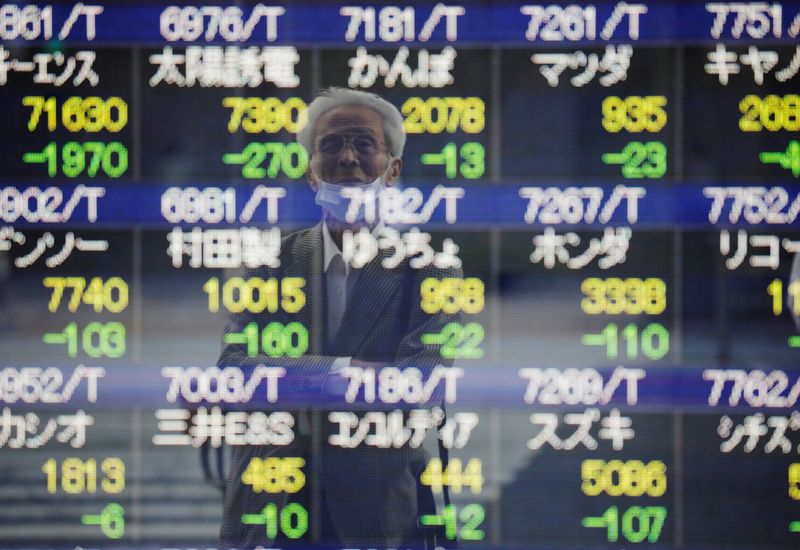 © Reuters. FILE PHOTO: A man wearing a protective mask, amid the COVID-19 outbreak, is reflected on an electronic board displaying stock prices outside a brokerage in Tokyo, Japan, September 21, 2021. REUTERS/Kim Kyung-Hoon
2/2
© Reuters. FILE PHOTO: A man wearing a protective mask, amid the COVID-19 outbreak, is reflected on an electronic board displaying stock prices outside a brokerage in Tokyo, Japan, September 21, 2021. REUTERS/Kim Kyung-Hoon
2/2
By Caroline Valetkevitch
NEW YORK (Reuters) - Stocks on global indexes rose sharply on Tuesday, with major U.S. stock indexes each ending up more than 2% following a recent selloff, while the Japanese yen fell against the U.S. dollar to its lowest level since October 1998.
Wall Street climbed as participants returned from a long weekend, with investors buying up shares of megacap growth and energy companies hit last week by global economic worries.
Energy shares climbed along with oil prices. Oil gained on high summer fuel demand.
"After back-to-back weeks of 5% declines, you've pushed the ball under the water far enough now that we're getting a bounce," said Paul Nolte, portfolio manager at Kingsview Investment Management in Chicago.
But, Nolte said, "interest rates are still going higher. Oil is still going higher."
Expectations of interest rate hikes from major central banks and worries about a global recession have kept investors on edge. Central banks are expected to tighten policy to combat high inflation.
The Dow Jones Industrial Average rose 641.47 points, or 2.15%, to 30,530.25, the S&P 500 gained 89.95 points, or 2.45%, to 3,764.79 and the Nasdaq Composite added 270.95 points, or 2.51%, to 11,069.30.
The pan-European STOXX 600 index rose 0.35% and MSCI's gauge of stocks across the globe gained 1.83%.
U.S. Treasury yields were higher as the risk-off mode that weighed on U.S. markets last week took a breather.
Benchmark 10-year yields were at 3.305%, up from their 3.239% close at the end of last week.
All eyes are now on Fed Chair Jerome Powell's testimony to the Senate Banking Committee on Wednesday for clues on rates.
Goldman Sachs (NYSE:GS) has said it now thinks there is a 30% chance of the U.S. economy tipping into a recession over the next year, up from its previous forecast of 15%.
In the foreign exchange market, the Japanese yen plunged against the U.S. dollar to 136.330 per dollar.
Japanese Prime Minister Fumio Kishida said the central bank should maintain its current ultra-loose monetary policy. This makes it an outlier among other major central banks.
Brent crude futures rose 52 cents, or 0.5%, to settle at $114.65 a barrel. The U.S. West Texas Intermediate (WTI) crude contract for July expired on Tuesday, closing at $110.65, with a gain of $1.09, or 1%. The more active August contract was up $1.53 at $109.52.
Spot gold dropped 0.3% to $1,832.27 an ounce.

